Is passion fruit as healthy as it is made out to be? Let's analyze the tropical fruit from peel to seed
Content:
- How to eat fresh fruits correctly?
- How many calories are in passion fruit?
- Vitamins and microelements in passion fruit
- What are the benefits of passion fruit?
- Beneficial properties of passion fruit for women
- Is it possible to eat fruit during pregnancy?
- Benefits of passion fruit seeds
- Applications of passion fruit peel
- Harm and contraindications
Is it possible to eat passion fruit in its pure form? What health benefits will it bring? In this article we will analyze the fruit from peel to seed.
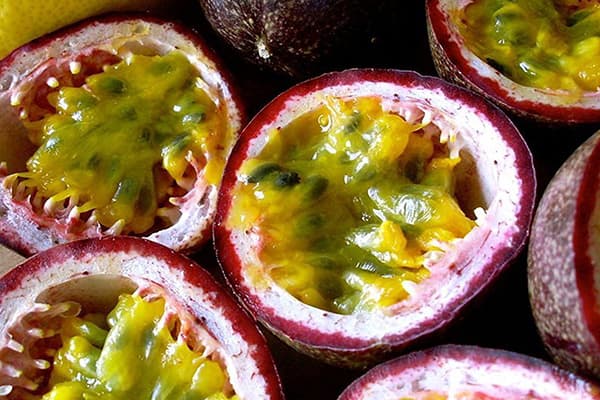
How to eat fresh fruits correctly?
The edible fruits are yellow or dark purple (depending on the variety). What does passion fruit taste like? Imported fruits are sweet and sour, with tropical notes. The softer the peel, the sweeter the flesh.
Before eating, wash the passion fruit under running water to remove the chemicals that are used to protect the skin from mold and parasites before long-term transportation.
Cut the fruit in half with a knife. Inside there is juicy pulp with seeds reminiscent of pomegranate seeds. The contents of passion fruit are eaten with a spoon.
How many calories are in passion fruit?
100 grams of the edible part contains 68 kcal. Passion fruit belongs to the category of low-calorie foods and is recommended for those who are on a diet.
How many calories are in passion fruit juice? It is better for those losing weight to avoid the drink. 100 grams contain 97-100 kcal and 23-25 g of carbohydrates.Due to the lack of fiber, juice is quickly absorbed and leads to a sharp increase in blood glucose levels.
Vitamins and microelements in passion fruit
Like many other tropical fruits, passion fruit is a natural multivitamin. The table below shows which vitamins and microelements passionflower fruits contain in large quantities.
Table 1. Substances in passion fruit and their benefits for the body
| Name | % of daily value (in 100 grams) | Beneficial features |
|---|---|---|
| Alimentary fiber | 0.52 | Reduce blood cholesterol levels, serve as food for beneficial intestinal bacteria, and normalize digestion |
| Vitamin C | 0.33 | Strengthens the immune system, protects the body from cancer and premature aging, increases the strength of blood vessels |
| Beta-carotene (converted to vitamin A in the body) | 0.15 | Prevents dry skin and hair, the appearance of early wrinkles, strengthens vision, supports immunity |
| Vitamin PP | 0.08 | Slows down inflammatory processes in the body, dilates blood vessels, removes toxins, takes part in the production of important hormones (testosterone, thyroxine) |
| Potassium | 0.14 | Regulates water-salt balance, normalizes blood pressure and heart rate, improves brain function |
| Phosphorus | 0.09 | Increases the strength of bones, nails and teeth, maintains normal acid-base balance of the blood |
| Iron | 0.09 | Transports oxygen to tissues and internal organs, prevents anemia, protects the health of the reproductive system |
The fruits are also rich in vitamins B2, B4, B6 and B9. Minerals include calcium, magnesium, copper, selenium and zinc.
What are the benefits of passion fruit?
Due to its high content of vitamin C, passion fruit helps prepare the body for the flu and ARVI season.To prevent respiratory infections, it is recommended to eat 100 grams of pulp with seeds per day. The juice is used as an antipyretic for fever.
What else is passion fruit good for? The fruit has a mild laxative effect, helps improve digestion and prevent the following problems:
- constipation;
- dysbacteriosis;
- gastritis;
- obesity.
The combination of potassium, magnesium and vitamin C makes passion fruit a valuable product for the prevention of cardiovascular diseases. The fruit strengthens blood vessels, normalizes heart rate and blood pressure, and reduces the level of “bad” cholesterol.
Passion fruit has a diuretic effect. It is used to get rid of edema, treat diseases of the urinary tract, kidneys and liver.
Delicious tropical juice tones the body and increases physical endurance. B complex vitamins have a positive effect on brain function and protect the nervous system from stress.
Beneficial properties of passion fruit for women
Passion fruit is a healthy fruit for women. Vitamin C and beta-carotene are natural antioxidants that protect body cells from premature aging. They improve the external condition of the skin, nails and hair. If a woman wants to preserve her natural beauty, she should include fruits with antioxidants in her diet, which includes passion fruit.
B vitamins support the normal emotional background of the fair sex. Vitamin PP and folic acid prevent hormonal imbalance in the body.
Due to regular menstruation, women are more likely than men to experience iron deficiency. They are worried about the following unpleasant symptoms:
- peeling of the skin, peeling of nails;
- decreased muscle tone;
- general weakness and fatigue;
- weakening of the immune system.
100 grams of passion fruit contains 9% of the daily value of iron. And in combination with vitamin C, this element is well absorbed.
Is it possible to eat fruit during pregnancy?
During pregnancy, passion fruit is allowed to be eaten only if this fruit has not previously caused side effects in the woman. Beta-carotene and phosphorus present in the fruit will have a positive effect on the formation of muscles and bones of the unborn baby. Folic acid will prevent uterine bleeding and miscarriage.
Pregnant women can consume passion fruit not only in its pure form. It is useful to drink freshly squeezed juice - the drink will relieve swelling and prevent constipation. It is recommended to add the fruit pulp to salads, low-fat yogurt, and cottage cheese casseroles.
Benefits of passion fruit seeds
Why should you eat passion fruit seeds along with the pulp? They contain dietary fiber, which has a positive effect on digestion, prevents constipation and reduces cholesterol levels.
Passion fruit seeds have a hypnotic and calming effect. Sometimes they are even used in the production of herbal sedatives. Therefore, you should not get carried away with fruits. If you want to perk up in the morning, drink freshly squeezed passion fruit juice, not pulp with seeds.
Applications of passion fruit peel
Has the peel found any use in cooking? Unfortunately, the skin of many varieties of passion fruit contains toxic substances and has a bitter taste, so it is not eaten. Don’t forget about treating fruits with chemicals against parasites and spoilage. In everyday life, passion fruit peel is used as fertilizer for other plants.
Harm and contraindications
Passion fruit has potential harmful properties and contraindications.If you consume the fruit in excess quantities (more than 300 grams per day), you may experience the following side effects:
- diarrhea;
- nausea;
- skin rashes;
- intestinal cramps;
- muscle weakness;
- drowsiness.
Passion fruit is an exotic fruit that causes allergies and food intolerances in many people. If you are eating fruits for the first time in your life, start with 0.5 teaspoon of pulp and see how your body reacts.
Avoid unripe passion fruit. This fruit contains few vitamins, but it greatly irritates the mucous membranes of the stomach and intestines.
You should absolutely not eat an exotic product in the following cases:
- when breastfeeding your baby;
- with exacerbation of chronic diseases of the gastrointestinal tract;
- for diabetes mellitus, since passion fruit contains many monosaccharides that are quickly absorbed.
Passion fruit can harm a small child's digestive system. It is not recommended to include the product in the diet of children under 3 years of age.
Thus, passion fruit is not only tasty, but also healthy tropical fruit. All parts of it are edible except the bitter peel. Passion fruit is eaten to strengthen the immune system, prevent diseases of the cardiovascular system, gastrointestinal tract, kidneys and liver - and just for fun! Just to get health benefits and not harm, it is important not to abuse the product.
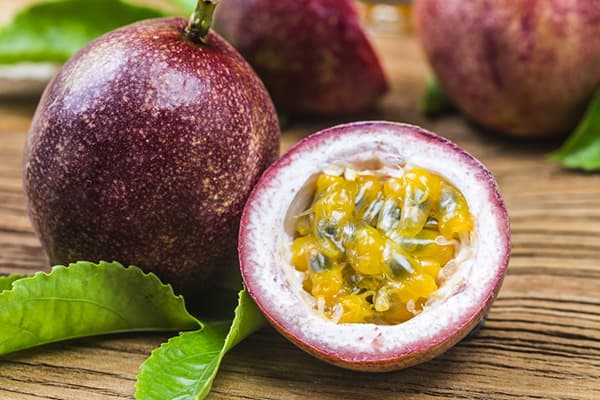
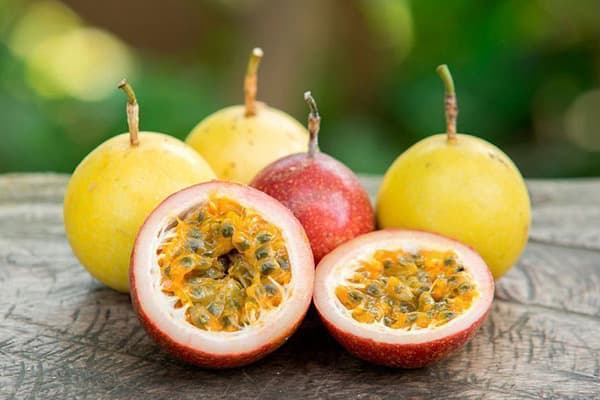
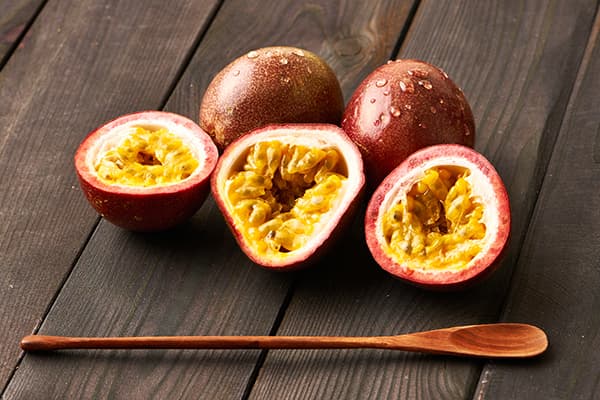

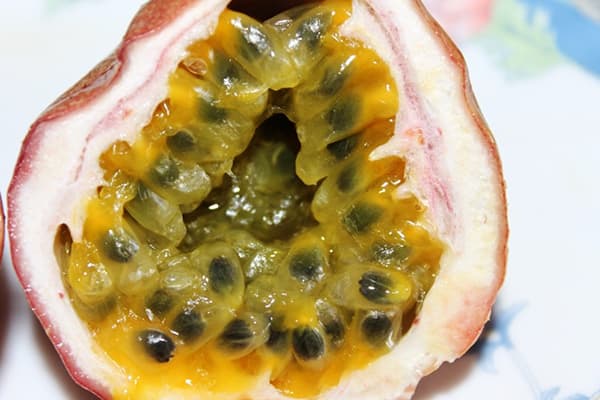
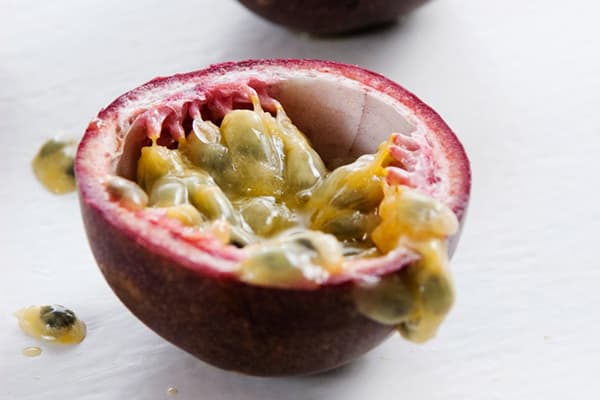
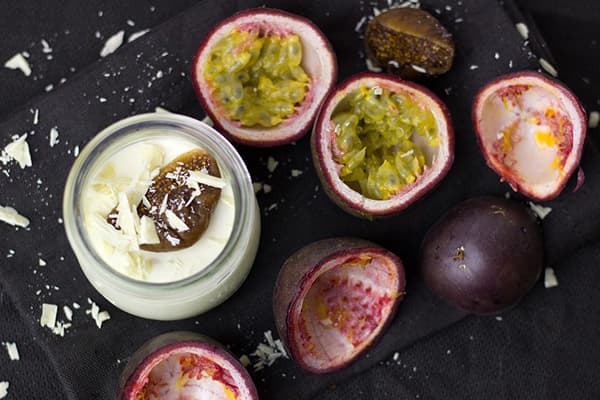
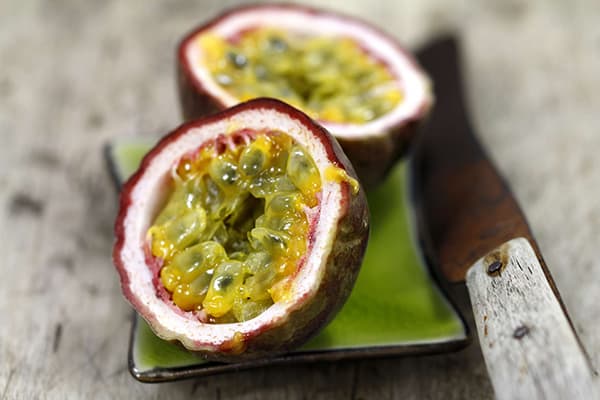
Very good article, short and clear. Thank you.
It’s sickening to read these “eat” and “eat”, and again “eat”.
The correct verb is “to eat”, don’t be afraid of it, it won’t eat you, but you will speak and write correctly.
I love passion fruit. I didn’t know that its peel can be used as fertilizer for plants. I'll have to try it.
I agree, I also didn’t know that the peels are used as fertilizer for plants. I really love this fruit.